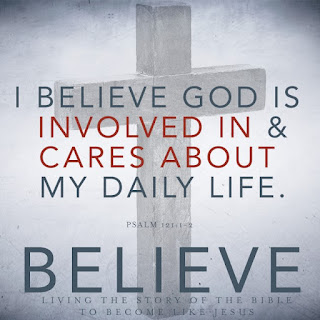When I was
in college, I had an early morning Spanish class and one morning, the teacher
asked the class, “What is your motivation for getting up out of bed every
morning?” She then narrowed her eyes towards me, and said, “Tim?”
Before I
share how I answered that, there is one final thought before we finish the
chapter on salvation: Not only does God save us from the penalty of sin, in the
power of sin and the presence of sin, but He also saves us from the
purposelessness of sin.
Our memory
verse this week is Eph. 2:8-9, but I have often said that we stop short of the
purpose of our salvation for others (and for God’s glory), found in Eph. 2:10.
Let’s read that in context.
8 For by
grace you have been saved through faith, and that not of yourselves; it is the
gift of God, 9 not of works, lest anyone should boast. 10
For we are His workmanship, created in Christ Jesus for good works, which God
prepared beforehand that we should walk in them.
The Greek
word for “workmanship” found in verse 10
is poema, showing that we are God’s work of art. Our purpose is to be
saved for good works and not by good works. Furthermore, these
works are prepared beforehand that we should walk in them. There is a job that
God has prepared to be done and He has
appointed you for salvation and also equipped you by His spiritual gifts
to do them.
Carrying
through on the Saving Grace, Sustaining Grace, and Supreme Grace titles, this
would be God’s Serving Grace. God has given us grace and peace in this
world for a purpose. Rick Warren made fame and fortune in writing two books, The Purpose-Driven Church and The Purpose-Driven Life. God has a
purpose for saving us and it really is not “all about you.” That’s the opening
line of The Purpose-Driven Life.
We see this
Serving Grace in 1 Peter. 4:10:
10 Each of
you should use whatever gift you have received to serve others, as
faithful stewards of God’s grace in its various forms.
When we get
to Chapter 17, we will learn more about the gifts of the spirit. Hopefully you
already know how you are gifted and more than that, that you are using your
gifts and eagerly desiring the greater gifts, (“But earnestly desire the best gifts. And yet I show you a more
excellent way.” Paul said in 1 Cor. 12:31…and what is the more excellent way?
Hint: this leads into 1 Corinthians chapter 13 and that is a different lesson!)
Now to
answer how I answered that teacher: I had no idea she was going to ask me this,
nor did I have an answer prepared beforehand. I know the Holy Spirit gave me
this answer and the teacher actually shared it with other classes I later found
out. I said to her and the class: “Every morning I wake up, I know that the God
of the universe lives in me. I know that He loves me and called me for a
purpose. To love Him and glorify Him and show Him to others. So, every day is an
adventure that we handle together.”
I was just
as astounded when I said it as the teacher was when she heard it. And even
though I have used that illustration repeatedly, I am still astounded that I
remember it so well. We are saved by God’s grace to serve, and we serve for a
purpose!


















